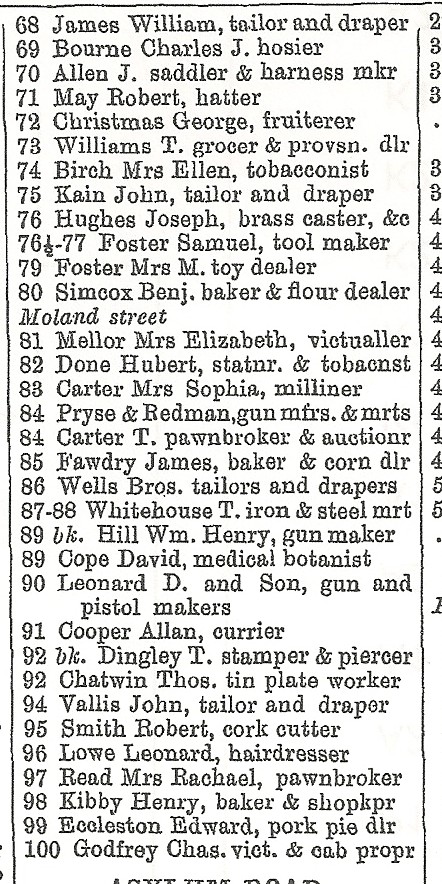Mikejee & Ernie
The 1950’s copy of Kelly’s that I have cites 66-67 Great Lister St as Mrs Deborah Wilson Greengrocer and 108 Henry St as George Silk Dining Rooms. It is obvious that sometime between 1950 and 1957 Silks moved to Great Lister St. I think at that time Ernie was just moving out of the area, and during that period I moved in. I have to be honest I have no personal memory of Silks Café.
I have to say it does not surprise me that another topographical book has got things wrong. You would think as this one “Developing Birmingham 1889 to 1989” having been produced by Birmingham City Council Development Department. The people responsible for tearing the heart out our city, they might have got thing right.
As there is a little write up about Henry St, I will reproduce it here for Ernie’s benefit, as I have already acknowledged the publication and it is only a tiny part of the book and I do not intend to reproduce it verbatim and it is a mixture of my words and theirs. I am sure they won’t mind.
This supposedly describes Henry St in 1967, but I am sure it had gone by then.
“ To town planners a street is only a line on a map, but to people who live in that street, it is something more. For some many generations have grown up in that street. Henry Street is such a street, ordinary with paint peeling off the houses and children squatting in the doorways. But it has memories.
You can walk into Silks Coffee shop, and you will revive some of those memories from George Silk the owner who took over from his father who opened the shop 43 years ago (from the date of the book publication). It had previously been a public house and a grocers shop.
Pigeon racing was a favourite sport of men in Henry Street in the days when George’s father kept the café. 200 to 300 fanciers would collect outside his shop every Sunday morning to cheer home their birds at the end of the weekly race from The Fox & Goose Washwood Heath.
A rat pit was another sports attraction the sport minded residents of Henry Street. People in Henry St would stick together. When the men had a game of cards on the footpath they always posted a sentry to watch out for the police. When they were spotted approaching each man dived for shelter in the nearest house, be it his own house or not.
Perhaps Henry St can be summed up in the words of George Silks mother. We always believed in being good neighbours. Some of the folks may have been a bit rough and ready but they helped each other in times of trouble. We just did not like being interfered with by strangers.”
In my opinion a bit of a fanciful description, but I do think it has merit and holds a few truths, I hope you enjoy it Ernie.
Phil










